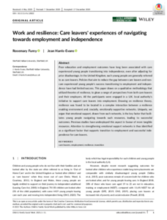Abstract
Poor education and employment outcomes have long been associated with care experienced young people transitioning into independence, even after adjusting for prior disadvantage. In the United Kingdom, such young people are generally referred to as care leavers. Policies that aim to reduce the gap between care leavers and non‐care experienced young people's success transitioning to employment and independence have had limited success. This paper draws on a qualitative methodology that utilized theories of resilience, to glean a range of perspectives from both care leavers and their employers. All the participants were engaged in a U.K. local authority's initiative to support care leavers into employment. Drawing on resilience theory, resilience was found to be located in a complex interaction between a resilience enabling environment and, crucially, emotionally supportive networks. Uniquely, we argue that emotional support, drawn from such networks, is the key factor that facilitates young people navigating towards such resources, leading to successful outcomes. Previous studies have underplayed this aspect in favour of more tangible resources. Attention to strengthening emotional support networks is thus identified as a significant factor that supports transition to employment and successful independence for care leavers.

